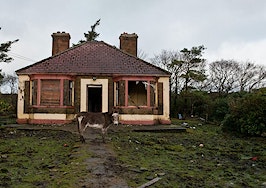Second quarter data shows that 15.2 million residential properties in the U.S. were considered equity-rich — a good sign in the midst of the pandemic — according to Attom Data Solutions’ most recent Home Equity and Underwater Report.
For a property to be equity-rich, the loans secured by it must be 50 percent or less of its estimated market value.
Equity-rich properties during the second quarter of 2020 represented 27.5 percent (roughly one in four) of the 55.2 million mortgaged homes in the U.S., up from 26.5 percent in Q1.
Seriously underwater properties — those with a combined estimated balance of loans secured by the property of at least 25 percent more than the property’s estimated market value — represented 1 in 16, or 6.2 percent, of all U.S. mortgaged properties. That number was down from 6.6 percent in the first quarter.
All but one out of 50 states showed an increase in the percentage of equity-rich homes, while three states had an increase in homes seriously underwater.
During a time of economic uncertainty and high unemployment, the housing market has remained strong as the value of owning a home has increased in the eyes of many Americans trying to avoid crowds and the coronavirus.

Todd Teta | ATTOM Data Solutions
“Homeowners saw their equity rise far and wide throughout the United States during the second quarter of this year in yet another sign of the housing market punching back against the coronavirus pandemic,” said Todd Teta, chief product officer with Attom Data Solutions, said in a statement. “More property owners rose into equity-rich territory and escaped the seriously underwater lane, putting more money into the average household.”
The Midwest and South showed the biggest gains in equity-rich homes and greatest declines in underwater properties during the second quarter, with seven out of 10 states with the most gains residing in these regions. Georgia saw the greatest increase, with equity-rich homes rising from 17.5 percent in Q1 to 20 percent in Q2.
States that also experienced significant increases included Idaho (up from 33.6 percent to 35.4 percent), Mississippi (up from 19.3 percent to 21 percent), Indiana (up from 23.5 percent to 25.2 percent) and Nebraska (up from 18.2 percent to 19.9 percent).
Nine out of 10 states that saw the biggest declines in seriously underwater homes were also located in the Midwest and South, led by West Virginia where the share of homes seriously underwater decreased from 15.7 percent the previous quarter to 13.8 percent. Other states that saw significant declines included Mississippi (down from 16.9 percent to 15 percent), Georgia (down from 9.9 percent to 8.4 percent), South Dakota (down from 12.4 percent to 11.1 percent) and Alabama (down from 11.3 percent to 10.2 percent).
Hawaii and Indiana, on the other hand, saw the percentage of seriously underwater homes increase 0.1 percent during the second quarter.
Although the Midwest and South saw the biggest gains, the Northeast and West continue to possess the largest shares overall of equity-rich homes. California maintained the highest percentage (43 percent), followed by Vermont (39.1 percent), Hawaii (38.6 percent), Washington (38.1 percent) and Idaho (35.4 percent).
Louisiana had the lowest percentage of equity-rich properties at 14 percent, followed by Oklahoma (15.6 percent), Illinois (15.6 percent), Arkansas (16.9 percent) and Alabama (17.6 percent) — the same five states with the lowest rates of equity-rich properties from Q1 2020 as well.
The top equity-rich counties were largely located in the West and Northeast with the highest shares located in San Mateo County (outside San Francisco), California (71.1 percent equity-rich); San Francisco County, California (68.3 percent); Santa Clara County (San Jose), California (64.9 percent); Dukes County (Martha’s Vineyard), Massachusetts (58.9 percent) and Alameda County (outside San Francisco), California (56.3 percent).
Areas that faced the highest seriously underwater shares of mortgages were largely located in the South and Midwest with the greatest shares located in Louisiana (16.4 percent seriously underwater), Mississippi (15 percent), Iowa (13.9 percent), West Virginia (13.8 percent) and Arkansas (12.4 percent).
“The housing market still faces enormous challenges, given that unemployment remains historically high and the broader economy contracted severely in the second quarter,” Teta added. “If that continues, owner equity will be seriously threatened. But for now, homeowners are enjoying the gains when it comes to what, for most, is their most significant asset.”







